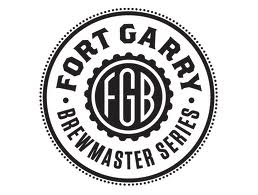 I don’t talk about Fort Garry much. The reason is that the Winnipeg brewer, owned by Vancouver’s Russell Brewing, offers fairly mediocre beer. The Fort Garry Dark is not a bad brown ale (although it sells itself as a lager), but on the whole their beer, while a step up from the big boys, doesn’t offer enough to a beer consumer to justify moving away from Half Pints, Yukon, Alley Kat, Wildrose or any other local craft brewer.
I don’t talk about Fort Garry much. The reason is that the Winnipeg brewer, owned by Vancouver’s Russell Brewing, offers fairly mediocre beer. The Fort Garry Dark is not a bad brown ale (although it sells itself as a lager), but on the whole their beer, while a step up from the big boys, doesn’t offer enough to a beer consumer to justify moving away from Half Pints, Yukon, Alley Kat, Wildrose or any other local craft brewer.
However, last year, they launched their Brewmaster Series, an attempt to produce more adventurous one-off styles to compete in the full-craft market. I haven’t had much of a chance to try any, as they have mostly been offered in Winnipeg exclusively. However, I got my hands on a bottle of their first attempt – their Munich Eisbock. Admittedly it is now about six months old, but given the alcohol, 9.5%, that shouldn’t be a problem.
Eisbocks are supposed to be uber-intense beer. A large bock frozen to allow the brewer to extract additional water, thus concentrating both the alcohol and the flavour. This is a very rare style, only produced by a handful of German brewers, the occasional north American craft brewer and Brewdog – who take it to a whole new level.
Their version is a very dark copper verging on reddish brown. The off-white head is a solid, consistent blanket covering the beer. It has good clarity, as might be expected. The aroma is dominated by a rich, bready and caramel malt aroma. I also pick up some rounded toast, a bit of raspberry and a hint of alcohol.
The flavour starts off with a complex malt sweetness whose primary character is bread and toffee. The body is less than expected and the beer dries out a bit at the end with a generic bitterness. Not a lot, mind you, just enough to prevent the beer from becoming cloying. They purport a 45 IBU bitterness, but I must admit I can’t see it. The dominant character is malt.
On the whole the beer doesn’t seem complex and full-bodied enough. If I were tasting it blind, I would guess is was a dopplebock – and not a bad version of it. But I expect a bit more intensity with an Eisbock, which should be rather uncomprimising with its maltiness. I understand that trying to work outside your tradtional block can be hard – I fully expect future versions of their Brewmasters Selece series to be much better.
For now, let me acknowledge what the beer achieves, while at the same time recognizing its limitations. This is not a perfect beer – it is simply too thin and timid. But, it tastes good and tells the consumer that they are about to experience something different. Isn’t that what we are all aiming for? If so, we need to appreciate every small effort to make better beer – even if it is not fully successful.


June 4, 2012 at 4:03 PM
It may be brewed and sold in Winnipeg, but I have been told that it is bottled in BC. Hmm…